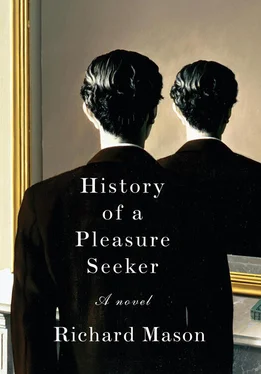Louisa Vermeulen-Sickerts had no acquaintance with the odors of masculine arousal. This did not mean she was oblivious to them, and now she remembered the odd smell Piet had brought with him into the entrance hall that day. She began to understand other things, too: why Piet had not been dismissed for shaming the family by carrying Egbert into a crowded street; why he had been permitted to behave with total freedom, as no tutor before him had done.
Jacobina, Maarten, Constance, and Piet re-entered the drawing room to find Louisa standing by the fire, very pale. They were pleased with the evening and themselves. His daughter’s pallor inspired penitence in Maarten. What if she really had a fever? He was about to order a hot chocolate for her to take to bed when she said: “Where is your green wool dress, Mama? The one with the small train?”
Jacobina had given much thought to how to dispose of sixteen yards of satin-lined wool — no small challenge in a house full of servants and sweet smells. She had decided against burning it in her aunt’s bedroom fireplace, which someone would have to clean. Neither could she burn it in her own room, for fear of the smell. She had considered dumping it in a canal, but what if it floated? In the end, she had stolen down to the kitchen at two o’clock in the morning and stuffed it into the furnace. All this flashed into her head as Louisa spoke. “It’s in my cupboard, I suppose.”
“No it’s not. I’ve checked.”
“Why ever did you do that?”
“Because of the way you and Mr. Barol looked at each other when he sang about sweet kisses and languid caresses.”
“What an idea, darling!”
“I found a button from that dress in Aunt Agaat’s bedroom this afternoon. What were you doing there?”
“No one goes into that room, as you very well know.”
“Well someone did, wearing a dress that now cannot be found.” Louisa spoke levelly. “You were wearing it the day Constance and Egbert and Papa went to the country. You went next door in it, after lunch. Why did you come back in one of Aunt Agaat’s dresses? And why did Mr. Barol follow you, smelling like — like — someone who has taken strenuous exercise?”
This last detail had the ring of truth. Maarten Vermeulen-Sickerts said “Louisa!” but he was looking at Piet Barol. And on Piet’s face, where he expected indignation, he saw fear.
“Where is it, Mama?”
“I don’t keep track of all my clothes.”
“Have you destroyed it? Was it ripped or damaged in some way?”
Now Constance lost her temper. “Do shut up, Louisa. Are you drunk?”
“I am upset, Constance.”
“But why, my sweet?”
“Because Piet Barol has seduced our mother.”
Maarten took charge. “My dear, let us go to bed.” He offered his wife his arm. “Louisa, I will deal with you severely in the morning. You have had too much wine. Mr. Barol, my apologies.”
But he left the room without shaking Piet’s hand.
Jacobina went with him. She knew she should protest, but truth boldly stated is hard to contradict to those who know us best. She climbed the stairs behind her husband and her silence confirmed to Maarten what the terror in Piet’s eyes had already told him. Both of them feigned calm. Jacobina called for Hilde and began to unpin her hair. Maarten went into his dressing room and took off his clothes.
He was eight years older than his wife: stocky and strongly built. He did not pay much attention to his appearance and the studied avoidance of personal vanity had taken its toll. His legs were greeny-white, almost hairless now. He turned sideways to observe himself in profile. His belly was the size of a woman’s in the sixth month of pregnancy. He thought of the marvelous suits Jacobina had bought him long ago, which he would never wear again: suits that now hung in the closet of Piet Barol. He sat down on a stool, dazed by his daughter’s revelation, and waited for a surge of rage to carry him through to morning.
But instead a very different emotion took hold of him. To his surprise, and at first against his will, he began to see things from his wife’s point of view.
Maarten had never considered that his sexual abstinence might have a cost for Jacobina. Now he saw that it inevitably did. Piet Barol was a tempting proposition to a woman. Was she not human, after all? She had enjoyed the carnal side of love in their first years of marriage. What if she missed it? What if Piet had laid siege to her, as he had once done, and reminded her of the attentions she no longer received from him? He put on his nightshirt and rang the bell. When Mr. Blok appeared, he spoke a few low words to him and went into his bedroom.
Jacobina was already in bed. They had shared this same bed for twenty-eight years and the moment of settling into it beside her was often the happiest of Maarten’s day. He had never told her this. As he repeated the familiar movement, the fact that he had lain so close to her for ten years without once embracing her no longer seemed admirable. He was an intelligent man and loved Jacobina deeply. Abruptly he understood how wounding these bedtimes had been for her: the long sequence of days brought to a close by nothing more intimate than a chaste good-night kiss. He remembered the occasion, many years before, when she had asked for what she wanted; the way he had refused her, proud of his own restraint. What sorrow he must have caused her!
He turned towards his wife. Jacobina was propped up on her pillows, eyes closed. She had made her pain clear to him in many subtle ways. He understood this now and was overcome by remorse. To have put his own salvation before the happiness of one whom he had vowed to cherish was abominable. He leaned closer to her. Jacobina could sense him. She could not imagine what he was doing. She was torn between apology and accusation. That Louisa should know! Her clever, self-contained Louisa. The little girl whose dolls she had once helped dress. It appalled her. She felt the mattress tilt. Surely he would not hit her? She had several times been slapped in the face as a child by the sullen English governess who succeeded Riejke Vedder. Her body tensed. But to her astonishment, which was followed by an outpouring of long-seasoned love, Maarten did not hit her.
He kissed her neck and said, “Forgive me.”
For the first time since their son’s birth, Maarten Vermeulen-Sickerts ran his hand under his wife’s nightdress. He buried his face in her hair and inhaled. Jacobina’s smell was familiar to him, complex and sweet and reassuring beneath her Parisian perfume. It excited him. He pressed against her and his fingers edged up her thigh. They tickled her and she jerked away.
“ Kiss me there,” she whispered.
With creaking joints he shifted place and pushed her nightgown to her waist and obeyed.
Maarten had never been as assured in bed as he was in business. He had too little experience to trust himself, which made him an anxious, perfunctory lover. Fortunately Jacobina was no longer as unsure as he was. She suggested what he should do and shifted her body until his tongue found the right spot. Maarten was grateful for direction. It was the first time anyone had used forbidden words to him and they charged his imagination. The impact his attentions were having on his wife gave him confidence. Each time he came close to spending Jacobina pulled away, and calmed him, and so subtly asserted her authority.
Jacobina had expected many things from Maarten, but not penitence. To receive an acknowledgment of the part he had played in her transgressions inspired an explosion of love, for his acceptance of her humanity was more profound than any man-made law or church-made vow. The idea of refining with him the lessons she had taught Piet Barol, night after night for the rest of their lives, overthrew her fears of the future. She pulled her nightdress off, then his. His body was not as hard as Piet’s, nor his skin as smooth and taut; but it was his body, and his skin, and for this reason alone she loved them.
Читать дальше












